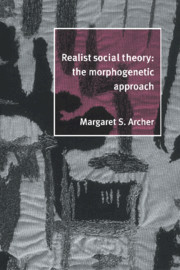1 - The vexatious fact of society
Published online by Cambridge University Press: 02 December 2009
Summary
Social reality is unlike any other because of its human constitution. It is different from natural reality whose defining feature is self-subsistence: for its existence does not depend upon us, a fact which is not compromised by our human ability to intervene in the world of nature and change it. Society is more different still from transcendental reality, where divinity is both self-subsistent and unalterable at our behest; qualities which are not contravened by responsiveness to human intercession. The nascent ‘social sciences’ had to confront this entity, society, and deal conceptually with its three unique characteristics.
Firstly, that it is inseparable from its human components because the very existence of society depends in some way upon our activities. Secondly, that society is characteristically transformable; it has no immutable form or even preferred state. It is like nothing but itself, and what precisely it is like at any time depends upon human doings and their consequences. Thirdly, however, neither are we immutable as social agents, for what we are and what we do as social beings are also affected by the society in which we live and by our very efforts to transform it.
Necessarily then, the problem of the relationship between individual and society was the central sociological problem from the beginning. The vexatious task of understanding the linkage between ‘structure and agency’ will always retain this centrality because it derives from what society intrinsically is. Nor is this problem confined to those explicitly studying society, for each human being is confronted by it every day of their social life.
- Type
- Chapter
- Information
- Realist Social TheoryThe Morphogenetic Approach, pp. 1 - 30Publisher: Cambridge University PressPrint publication year: 1995
- 1
- Cited by



